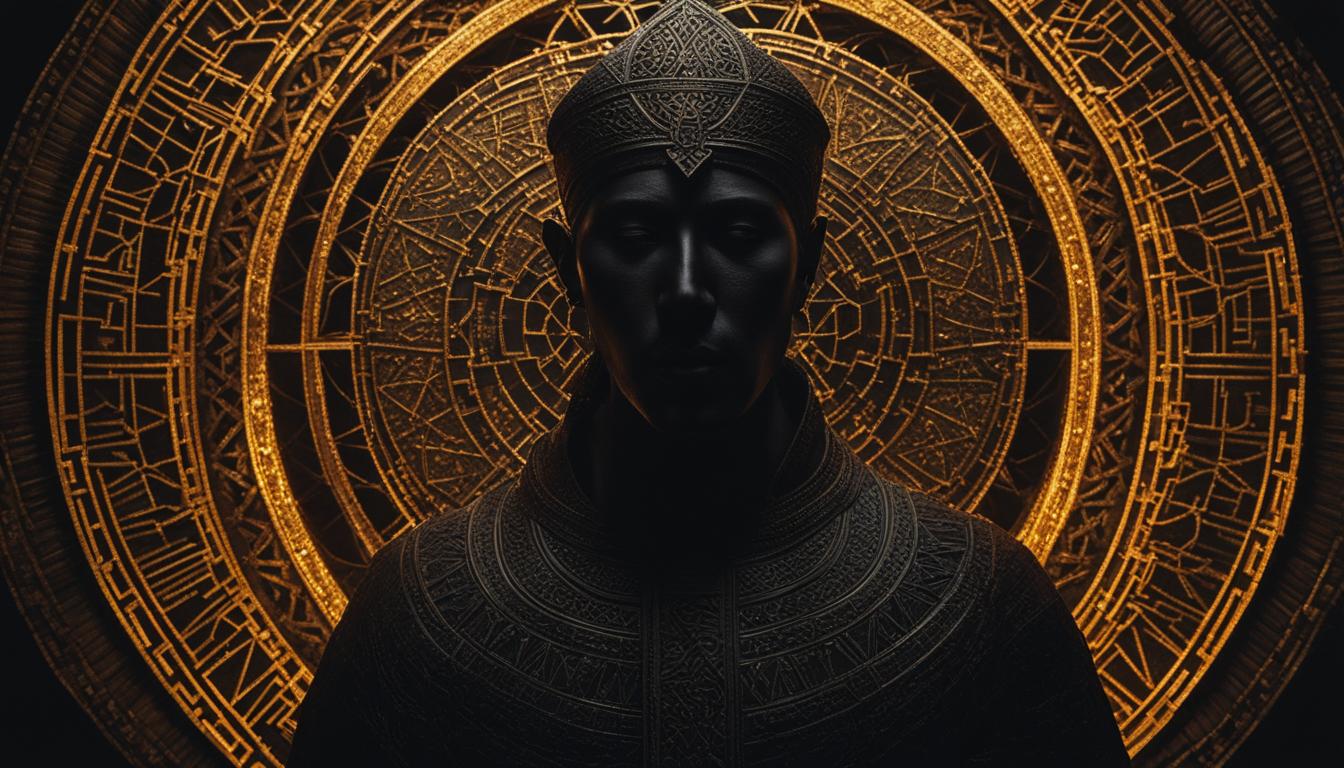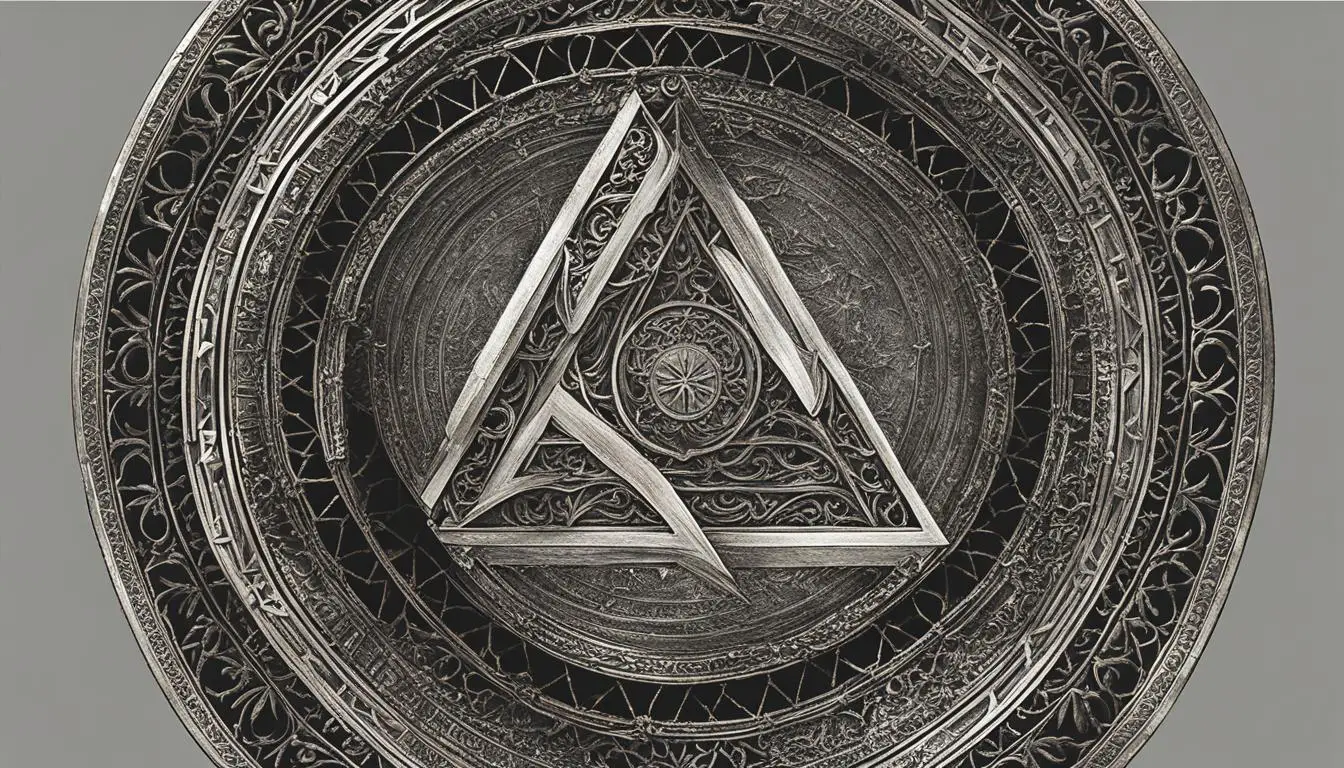The concept of being made in the image of God is a central theme in the Bible, but what does it really mean? In this article, we will explore the biblical interpretation of the image of God and uncover its profound significance. As we delve into the origins, meaning, and impact of the image of God, we will gain a deeper understanding of our identity, purpose, and worth.
Key Takeaways:
- The Bible does not provide a direct answer to the definition of being made in the image of God
- Being made in the image of God means being connected to Him intellectually, morally, spiritually, and personally
- Humans reflect God’s character and greatness through their unique abilities
- The image of God has been marred by sin, but restoration is possible through Jesus Christ
- Understanding the image of God helps us recognize the worth and dignity of every individual
The Origins of the Image of God
The concept of being made in the image of God is introduced in the first book of the Bible, Genesis. Genesis 1:26-27 states that God created humans in His own image and likeness. This means that humans hold a special place in God’s creation, with unique abilities and the responsibility to have dominion over the earth.
The Bible also mentions the image of God in other passages, such as Psalm 8, which further emphasizes the significance of this concept. These verses highlight the divine intention behind human existence and emphasize the inherent value and purpose of each individual.
“When I consider your heavens, the work of your fingers, the moon and the stars, which you have set in place, what is mankind that you are mindful of them, human beings that you care for them? You have made them a little lower than the angels and crowned them with glory and honor.”
This passage from Psalm 8 reflects on the beauty and magnificence of God’s creation, underscoring the idea that humans are created with a unique position and purpose within it.

The Hebrew and Greek Origins
The term “image of God” is derived from the Hebrew word “tselem,” which means an image, representation, or figure. In the Greek translation of the Old Testament, known as the Septuagint, the word used is “eikōn,” which also carries the meaning of an image or likeness.
These linguistic origins provide insight into the biblical understanding of the image of God, affirming the idea that humans are created as a representation or reflection of God’s nature and character.
The Image of God in Biblical Context
The image of God signifies the unique relationship and connection between humans and their Creator. It encompasses various aspects of human nature, including our intellectual, moral, and spiritual capacities.
Being made in the image of God means that we have the ability to reason, make moral choices, and have spiritual communion with God. It also implies that we possess inherent dignity, worth, and purpose, as we reflect and represent God’s character and glory in the world.
Biblical Verses on the Image of God
Genesis 1:26-27 – “Then God said, ‘Let us make mankind in our image, in our likeness, so that they may rule over the fish in the sea and the birds in the sky, over the livestock and all the wild animals, and over all the creatures that move along the ground.’ So God created mankind in his own image, in the image of God he created them; male and female he created them.”
Psalm 8:3-5 – “When I consider your heavens, the work of your fingers, the moon and the stars, which you have set in place, what is mankind that you are mindful of them, human beings that you care for them? You have made them a little lower than the angels and crowned them with glory and honor.”
| Book | Verses |
|---|---|
| Genesis | 1:26-27 |
| Psalm | 8:3-5 |
The Meaning of Being Made in the Image of God
Being made in the image of God holds profound significance in the biblical context. While it does not imply a physical resemblance to God, it signifies a reflection of His character, worth, and greatness. As humans, we reflect God’s divine nature through our intellectual and moral abilities, our capacity to understand and respond to Him, our emotions, and our free will to choose obedience or disobedience. The image of God in us serves as a visible manifestation of His character, allowing us to represent Him in the world.
The biblical concept of being made in the image of God emphasizes our unique connection and likeness to Him. It reveals that we are not mere products of chance or random evolution, but intentionally designed by a loving Creator. This concept also affirms our inherent dignity and worth as individuals, reminding us of our purpose to reflect God’s character and fulfill His intended plan for our lives.
“Being made in the image of God means that we are created with the capacity to love, to reason, to make moral choices, and to engage in a personal relationship with God. It also means that we possess intrinsic value and worth, regardless of our abilities or circumstances.”
Understanding the significance of the image of God helps shape our identity, purpose, and perspective on life. It reminds us that each person we encounter bears this image, deserving of respect, love, and dignity. It calls us to cultivate relationships that honor the image of God in others and to seek justice and equality for all. Additionally, recognizing the image of God in ourselves empowers us to use our unique abilities and gifts to contribute positively to the world, fulfilling our calling as God’s representatives.
| Key Points | Key Bible Verses |
|---|---|
| Being made in the image of God means reflecting His character and greatness | Genesis 1:26-27; Psalm 8:4-6 |
| It does not imply physical resemblance, but rather intellectual, moral, and spiritual connection | Colossians 3:10; Ephesians 4:24 |
| Being made in God’s image affirms our inherent worth and dignity | Genesis 9:6; James 3:9 |
| The image of God empowers us to fulfill our purpose and contribute positively to the world | Ephesians 2:10; Matthew 5:16 |
The Impact of Sin on the Image of God
The concept of the image of God holds significant meaning in Christianity and the religious context. However, the image of God in humans has been marred and distorted by sin. The consequences of sin have had a profound effect on our ability to reflect God’s divine nature and display His character in our lives.
When Adam and Eve chose to disobey God in the Garden of Eden, it marked the beginning of humanity’s departure from the perfect reflection of God’s image. This disobedience shattered the intimate relationship that humans once had with God, and it introduced sin and brokenness into the world.
As a result of sin, our perception of God’s character and our ability to accurately reflect it have become distorted. We have inherited a sin nature that inclines us to selfishness, disobedience, and rebellion against God. This brokenness affects every aspect of our being, including our thoughts, emotions, and actions.
However, despite the devastating impact of sin, Christianity offers hope and redemption through Jesus Christ. Through His sacrifice on the cross, Jesus reconciles us with God and provides a way for the restoration of the image of God within us. Through faith in Jesus, we can experience forgiveness, transformation, and the gradual renewal of our likeness to God’s character. The process of restoration is ongoing and is empowered by the Holy Spirit working in us.

The Restoration of the Image of God
The restoration of the image of God begins with accepting Jesus as our Savior and Lord. It involves surrendering our lives to Him and allowing Him to renew our minds, purify our hearts, and transform our lives. As we submit to the leading of the Holy Spirit, we are gradually conformed to the likeness of Christ and restored to the image of God that we were originally created in.
This restoration is not only an individual process but also extends to the community of believers. As we come together as the body of Christ, we have the opportunity to encourage and support one another in our journey of restoration. Through love, forgiveness, and accountability, we can help each other reflect the image of God more fully and authentically.
Ultimately, the complete restoration of the image of God will be realized in eternity. When Jesus returns, He will transform our mortal bodies into glorious, imperishable ones, perfectly reflecting the image of God. Until then, we strive to live in obedience to God’s Word, relying on His grace, and allowing His Spirit to work in us, bringing us closer to the image of God with each passing day.
Restoring the Image of God
Restoring the image of God is a central theme in the Bible, showcasing God’s plan for redemption and renewal. Through Jesus’ incarnation, life, death, and resurrection, God provided a way for humanity to be restored to the image of God. By accepting Jesus as Lord and Savior, we acknowledge Him as the ultimate Ruler and King over our lives. The Holy Spirit then works in us to transform us into the image of Christ.
Being restored to the image of God means that we are being conformed to the likeness of Christ, who perfectly reflected the image of God during His earthly ministry. This transformation is a lifelong process as we grow in our faith and surrender to the Holy Spirit’s work within us. It involves aligning our thoughts, desires, and actions with God’s will, seeking to imitate Christ in every aspect of our lives.
“And we all, who with unveiled faces contemplate the Lord’s glory, are being transformed into his image with ever-increasing glory, which comes from the Lord, who is the Spirit.” – 2 Corinthians 3:18
Our purpose on earth is to glorify God by bearing the image of Christ and reflecting His character through obedience to His teachings. This includes loving our neighbors, serving others, pursuing holiness, and living with integrity. When we live in accordance with God’s plan for our lives, we become a visible representation of God’s love, grace, and truth to the world around us.
Restoring the Image of God: A Process of Renewal
The restoration of the image of God is not a one-time event but a continuous process of renewal. It involves allowing God to work in us, shaping our hearts, minds, and actions to reflect His character. As we walk in fellowship with God and seek His guidance, He empowers us to overcome sin and grow in godliness.
| Aspects of Restoration | Scripture References |
|---|---|
| Renewal of the Mind | Romans 12:2, Ephesians 4:23 |
| Transformation of the Heart | Ezekiel 36:26, 2 Corinthians 5:17 |
| Growth in Knowledge of God | Colossians 3:10, 2 Peter 3:18 |
| Conformity to the Image of Christ | Romans 8:29, 1 Corinthians 15:49 |
Through the process of restoration, we are being transformed from glory to glory, reflecting more and more of God’s character and attributes. It is a journey that requires surrender, obedience, and dependence on the Holy Spirit. As we actively participate in this process, we can experience the joy and fulfillment of living as true image bearers of God.

Restoring the Image of God: Our Identity and Mission
The restoration of the image of God not only impacts our individual lives, but also shapes our identity and mission as followers of Christ. As image bearers of God, we are called to represent Him in every sphere of life, whether in our families, workplaces, communities, or the world at large.
Our restored image empowers us to love others selflessly, seek justice, practice mercy, and extend grace to all. It inspires us to pursue reconciliation, promote peace, and contribute positively to the well-being of society. Restored to the image of God, we become ambassadors of His kingdom, pointing others to the hope, healing, and restoration found in Christ.
As we live out our restored image, let us remember the words of Jesus:
“You are the light of the world. A town built on a hill cannot be hidden… let your light shine before others, that they may see your good deeds and glorify your Father in heaven.” – Matthew 5:14,16
Interpreting the Image of God
Interpreting the concept of the image of God has been a subject of debate among scholars and theologians. Various interpretations have emerged, offering different perspectives on its meaning and implications. Some focus on the relational aspect of the image of God, emphasizing the connection between humans and their Creator.
Others emphasize the moral and intellectual dimensions of the image of God, highlighting the capacity for rationality, creativity, and moral responsibility. The debate also extends to the extent to which the image of God is affected by sin and the means of its restoration.
While there is no consensus on a single interpretation, the diversity of perspectives enriches the understanding of this profound concept. It invites individuals to engage with Scripture, critically analyze different viewpoints, and develop their own understanding of the image of God.
“The image of God is a multifaceted concept that encompasses various aspects of human nature. It invites us to explore the depths of our relationship with God and the purpose for which we were created.”
The interpretation of the image of God is an ongoing dialogue within theological circles, constantly evolving as new insights are gained. It reminds us of the complexity and richness of Scripture, encouraging us to approach the topic with humility and open-mindedness.

Theological Interpretations of the Image of God
| Interpretation | Key Points |
|---|---|
| Relational | Emphasizes the connection between humans and God, highlighting the capacity for fellowship and intimacy. |
| Moral and Intellectual | Focuses on the moral and intellectual abilities of humans, such as reason, creativity, and moral responsibility. |
| Ontological | Explores the ontological nature of the image of God, delving into questions of essence and being. |
| Functional | Highlights the purpose and responsibilities bestowed upon humans as image-bearers, such as stewardship of creation. |
Relevance of the Image of God Today
The concept of being made in the image of God holds deep significance and relevance in today’s world. Understanding that each person bears the image of God provides a strong foundation for acknowledging the intrinsic dignity and worth of every individual. This knowledge shapes our relationships and interactions, guiding us to treat others with respect, love, and compassion.
As we encounter different individuals, we are reminded that they too reflect the image of God. This understanding prompts us to value and honor each other, regardless of our differences. It encourages us to foster unity, empathy, and understanding, realizing that we are all part of a larger human family created in God’s image.
| Bible Story | Lesson |
|---|---|
| The Good Samaritan (Luke 10:25-37) | The parable of the Good Samaritan teaches us to extend love and compassion to all, regardless of social or cultural barriers. |
| The Prodigal Son (Luke 15:11-32) | This story illustrates the Father’s unconditional love and forgiveness, pointing to our need to show grace and mercy to others. |
| The Woman at the Well (John 4:1-42) | Jesus’ encounter with the Samaritan woman highlights the value and worth of every individual, breaking down societal barriers and prejudices. |
Recognizing the image of God in ourselves and others also empowers us to utilize our unique abilities and gifts for the glory of God. Each person is endowed with talents and passions that can be used to make a positive impact in the world. When we embrace our identity as bearers of God’s image, we are inspired to pursue justice, righteousness, and the transformation of society.
Ultimately, the image of God reminds us of the divine purpose and calling on our lives. It guides our understanding of right and wrong, motivating us to align our actions and choices with God’s character. Embracing the image of God is a lifelong journey, deepening our connection with Him and shaping our interactions with others, making the world a more compassionate and just place.
The Image of God in Today’s World
In today’s world, where human life and dignity are often devalued, the biblical concept of the image of God holds great significance. It serves as a powerful reminder of the inherent worth and value of every individual, regardless of their abilities or circumstances. As we navigate through a society that can sometimes prioritize material gain and success over compassion and empathy, understanding the image of God becomes crucial in shaping our attitudes and actions towards others.
“God created humans in his own image, in the image of God he created them; male and female he created them.” – Genesis 1:27
The image of God compels us to treat others with respect, love, and compassion, recognizing that every person we encounter bears the divine image. It challenges us to advocate for justice and fairness, fighting against any form of discrimination or oppression that undermines the inherent worth of individuals. When we see others through the lens of the image of God, it transforms our perspective and motivates us to extend grace and kindness to all.
Furthermore, the image of God empowers us to use our unique abilities and gifts to fulfill our calling and contribute positively to the world. Just as God is a creative, loving, and compassionate being, we are called to reflect these qualities in our own lives. Whether through acts of service, pursuing justice, or using our talents to bring joy to others, our lives can become a testament to the image of God within us.
| Aspects of the Image of God | Implications for Today |
|---|---|
| Reflection of God’s character | Reminding us of the inherent worth and value of every individual |
| Intellectual and moral capacities | Inspiring us to pursue justice, fairness, and ethical decision-making |
| Free will and responsibility | Empowering us to make choices that align with God’s character |
| Connection with God | Guiding our relationships and interactions with others |
As we strive to live out the image of God, we are reminded of our purpose and identity as children of God. It is through this understanding that we can actively participate in shaping a world that reflects His love, mercy, and justice.
The Image of God and Right and Wrong
The interpretation of the image of God in the Bible has significant implications for our understanding of right and wrong. As beings created in God’s image, we are called to reflect His character and morality in our actions and choices. The image of God serves as a moral compass, guiding our ethical decision-making and shaping our understanding of what is righteous and just.
Throughout the Bible, we find numerous examples of God’s standards of right and wrong. The Ten Commandments, given to Moses on Mount Sinai, provide a clear framework for moral behavior. These commandments encompass various aspects of human relationships with God and with one another, emphasizing the importance of love, respect, and justice. By following these commandments and embodying the image of God, we strive for righteousness in our thoughts, words, and deeds.
“Let love be genuine. Abhor what is evil; hold fast to what is good.” – Romans 12:9
Additionally, the teachings of Jesus further elucidate the principles of right and wrong. In the Sermon on the Mount, Jesus expounds upon the commandments, highlighting the significance of inner attitudes and intentions. He challenges his followers to go beyond mere external compliance and to cultivate the virtues of humility, mercy, and forgiveness.
By studying the Bible and seeking divine guidance, we can develop a deeper understanding of right and wrong in accordance with the image of God. This understanding empowers us to make choices that align with God’s character and contribute to the flourishing of humanity and the world. It calls us to reject sin and the values of the world that contradict the image of God, and to actively pursue righteousness, justice, and love.
| Right | Wrong |
|---|---|
| Showing kindness and compassion to others | Causing harm or taking advantage of others |
| Seeking justice and equality for all | Exploiting or oppressing others |
| Speaking truth with love | Lying or spreading falsehoods |
| Forgiving and seeking reconciliation | Nursing grudges or seeking revenge |
As we strive to reflect the image of God in our lives, we are empowered to make choices that honor His character and contribute to the well-being of others. The image of God serves as a constant reminder of the high standards of morality to which we are called and guides us in discerning right from wrong in every aspect of life.
Conclusion
The concept of being made in the image of God holds immense significance in Christianity and the religious context. It encompasses various aspects of human nature and serves as the foundation for understanding our identity, purpose, and worth. Although sin has marred the image of God in humanity, there is hope for restoration through Jesus Christ.
Understanding the image of God enables us to honor the dignity and worth of every individual. It calls us to treat others with respect, love, and compassion, and to advocate for justice in a world that often devalues human life. The image of God also provides a moral compass, guiding our ethical decision-making and calling us to strive for righteousness and love.
While scholars and theologians may offer different opinions on the image of God, studying Scripture and engaging in theological discourse help us develop our own understanding. The image of God remains relevant and applicable today, empowering us to use our unique abilities and gifts to contribute positively to the world and reflect God’s character.
FAQ
What does it mean to be made in the image of God?
Being made in the image of God means being connected to Him intellectually, morally, spiritually, and personally. It also means that we are created with unique abilities that reflect God’s nature. Ultimately, being made in the image of God means being a visible reflection of His character and greatness.
Where in the Bible is the concept of the image of God introduced?
The concept of the image of God is introduced in Genesis 1:26-27, where it states that God created humans in His own image and likeness.
Does being made in the image of God mean we physically resemble Him?
No, being made in the image of God does not mean we physically resemble Him. Instead, it means that we reflect His character, worth, and greatness in our intellectual and moral abilities, our capacity to understand and respond to God, our emotions, and our free will.
How has the image of God in humans been affected by sin?
The image of God in humans has been marred and distorted by sin. When Adam and Eve chose to disobey God in the Garden of Eden, they disrupted the perfect reflection of God’s image in them. As a result, humanity lost the ability to properly reflect God’s divine nature.
How is the image of God restored?
The image of God is restored through Jesus Christ. By accepting Jesus as Lord and Savior, we acknowledge Him as the ultimate Ruler and King over our lives. The Holy Spirit then works in us to transform us into the image of Christ.
Are there different interpretations of the image of God?
Yes, scholars and theologians offer various interpretations of the image of God. Some view it as a relational concept, emphasizing the connection between humans and God, while others focus on the moral and intellectual aspects of the image of God.
How does the image of God remain relevant today?
The image of God remains relevant today as it serves as a foundation for understanding the significance and purpose of human life. It gives us a sense of dignity and worth, shapes our understanding of relationships, and empowers us to use our unique abilities and gifts to contribute positively to the world.
How does the image of God inform our understanding of right and wrong?
Since we are made in God’s image, we are called to reflect His character in our actions and choices. This means striving for righteousness, justice, and love, and rejecting sin and values that contradict the image of God.
What is the biblical explanation of the image of God?
The Bible does not provide a direct answer to what it means to be made in the image of God. However, clues scattered throughout Scripture help us grasp the concept. Being made in the image of God means being connected to Him intellectually, morally, spiritually, and personally, and being a visible reflection of His character and greatness.








Leave a Reply